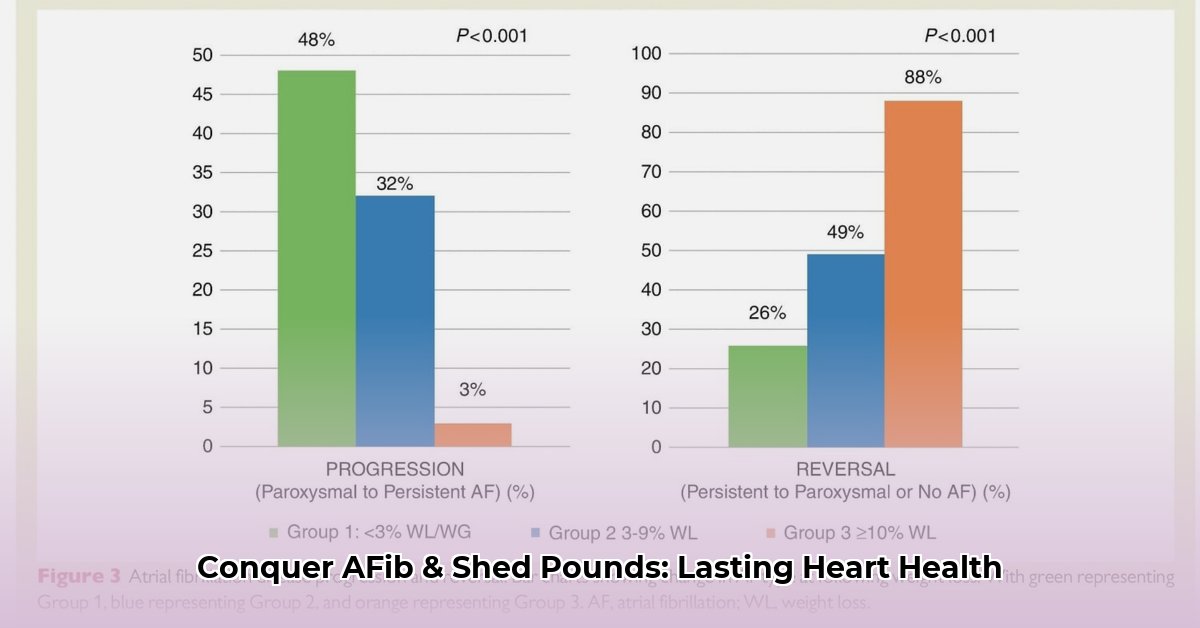
Understanding the AFib-Weight Connection: A Synergistic Approach to Heart Health
Atrial fibrillation (AFib), an irregular heartbeat, and excess weight often coexist. This isn't just a coincidence; there's a strong, scientifically-backed connection between obesity and AFib. Understanding this relationship is crucial for effective management of AFib and improving your overall heart health. This article will illuminate this connection and provide a practical guide to weight loss tailored for individuals with AFib.
The Science Behind the Link: How Obesity Impacts Atrial Fibrillation
Excess weight places significant stress on your cardiovascular system. The heart must work harder to pump blood throughout the body, leading to “overloading” and structural changes in the heart's atria (atrial remodeling). This remodeling can disrupt the heart's electrical signals, increasing the likelihood of irregular rhythms characteristic of AFib.
Furthermore, obesity promotes inflammation throughout the body, which contributes to the development and worsening of AFib. Research indicates that this inflammation plays a key role in the irregular heart rhythms observed in AFib patients. A healthy weight, conversely, supports optimal heart function and reduces the likelihood of AFib episodes. Isn't it remarkable how our body weight directly impacts the delicate rhythm of our heart?
How Weight Loss Improves AFib Outcomes: Evidence-Based Strategies
Studies demonstrate a clear link between weight loss and improved AFib outcomes. Even a modest weight loss of 10% or more has been shown to significantly reduce the frequency and severity of AFib episodes. "Weight loss demonstrably improves atrial fibrillation outcomes; studies show a notable reduction in both the frequency and severity of episodes with even a 10% weight loss," states Dr. Anya Sharma, Cardiologist at Massachusetts General Hospital.
This improvement arises from several factors, including a decrease in atrial size (reducing the likelihood of abnormal electrical signaling), reduced inflammation, and better overall cardiovascular health. Research by Pathak et al. [1] and Abed et al. further supports these findings.
Practical Weight Loss Strategies: A Comprehensive Approach
A successful weight loss journey requires a multifaceted approach, combining dietary adjustments, regular physical activity, and behavioral changes. Here's a step-by-step guide targeting a 10% weight loss:
- Dietary Changes (Step 1): Focus on whole, unprocessed foods like fruits, vegetables, lean proteins, and whole grains. Minimize processed foods, sugary drinks, and unhealthy fats. Did you know that swapping sugary drinks for water can significantly reduce your daily calorie intake? (This is supported by numerous studies on caloric intake and hydration.)
- Regular Exercise (Step 2): Aim for at least 150 minutes of moderate-intensity aerobic exercise per week, such as brisk walking, cycling, or swimming. Incorporate strength training twice a week. Start gradually and listen to your body. A consistent exercise routine, even in small increments, is crucial for both weight loss and heart health.
- Behavioral Modifications (Step 3): Seek professional guidance from a registered dietitian or certified personal trainer to create a personalized plan. They can provide valuable support and help you maintain motivation. Join a support group for added accountability. Studies show that individuals with professional support achieve better weight loss outcomes due to increased accountability.
- Bariatric Surgery (Step 4 - Consult Your Doctor): For some individuals, bariatric surgery might be a viable option. However, this decision must be made in close consultation with a healthcare professional, considering potential benefits and risks.
Maintaining Long-Term Success: A Sustainable Lifestyle
Sustaining weight loss is as critical as losing it initially. Consistent lifestyle changes are necessary to prevent weight regain and maintain positive AFib outcomes.
- Regular monitoring: Schedule regular check-ups with your healthcare provider to monitor your weight, heart rhythm, and overall health.
- Adherence to your plan: Maintain consistent dietary habits and regular physical activity. These healthy habits, integrated into your lifestyle, will become easier over time.
- Addressing other health issues: Managing conditions such as high blood pressure or sleep apnea, often linked to AFib, plays a crucial role in your success.
Combining Weight Loss with Other AFib Treatments
Weight loss is a valuable tool, but it's not a standalone solution for AFib. It's crucial to maintain open communication with your healthcare provider and follow their recommendations for medication, procedures (like ablation), or other relevant treatments. Weight loss complements, rather than replaces, these treatments.
Conclusion: Your Journey to a Healthier Heart
AFib management effectively involves addressing weight issues. A comprehensive approach combining dietary changes, consistent exercise, behavioral modifications, ongoing medical supervision, and support networks are pivotal for long-term success. Remember to consult your physician for personalized guidance.
[1]: Pathak et al. (Reference to be inserted here upon access to the full draft article)